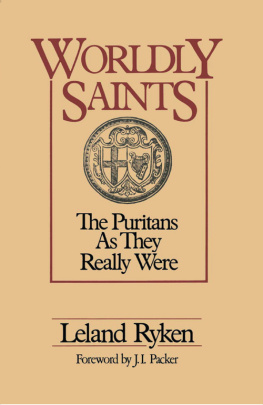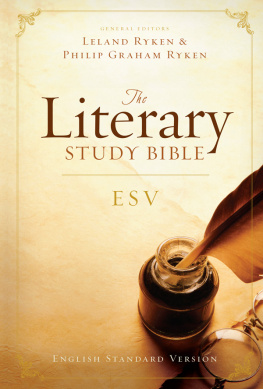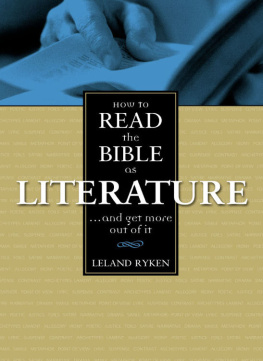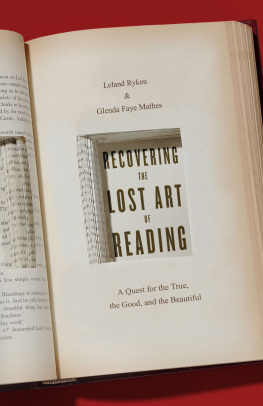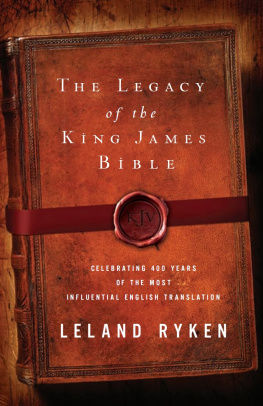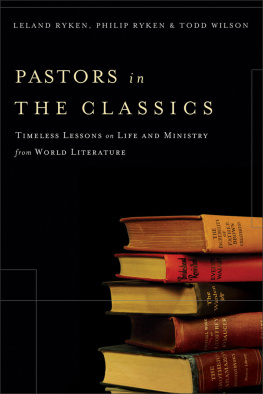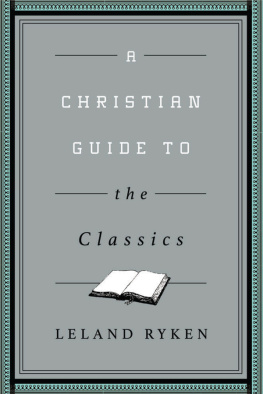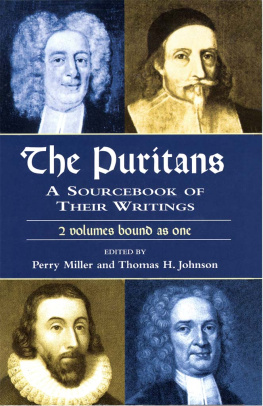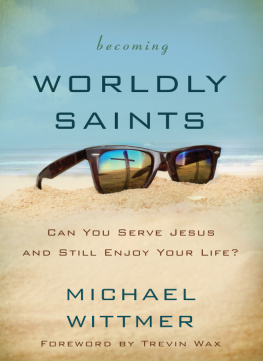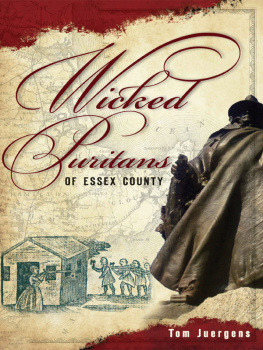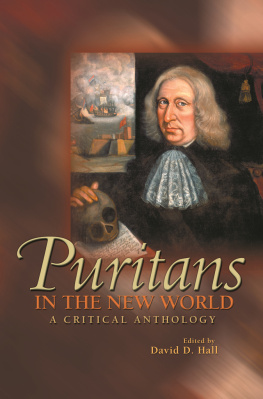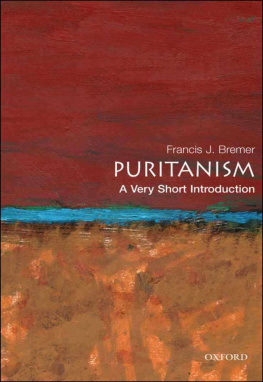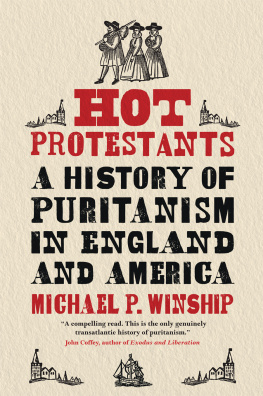For Al and Florence Graham

The Puritans were worldly saints. As this painting of the first Thanksgiving in America shows, the Puritans had a zest for earthly life accepted as Gods gift. Brownscombe, First Thanksgiving; courtesy of the Pilgrim Society
FOREWORD
Why We Need the Puritans
J I. PACKER
I
Horse racing is said to be the sport of kings. The sport of slinging mud has, however, a wider following. Pillorying the Puritans, in particular, has long been a popular pastime on both sides of the Atlantic, and most peoples image of Puritanism still has on it much disfiguring dirt that needs to be scraped off.
Puritan as a name was, in fact, mud from the start. Coined in the early 1560s, it was always a satirical smear word implying peevishness, censoriousness, conceit, and a measure of hypocrisy, over and above its basic implication of religiously motivated discontent with what was seen as Elizabeths Laodicean and compromising Church of England. Later the word gained the further, political connotation of being against the Stuart monarchy and for some sort of republicanism; its primary reference, however, was still to what was seen as an odd, furious, and ugly form of Protestant religion. In England, anti-Puritan feeling was let loose at the time of the Restoration and has flowed freely ever since. In North America it built up slowly after the days of Jonathan Edwards to reach its zenith a hundred years ago in post-Puritan New England.
For the past half-century, however, scholars have been meticulously wiping away the mud. And as Michelangelos frescoes in the Sistine Chapel have unfamiliar colors today now that restorers have removed the dark varnish, so the conventional image of the Puritans has been radically revamped, at least for those in the know. (Knowledge, alas, travels slowly in some quarters.) Taught by Perry Miller, William Haller, Marshall Knappen, Percy Scholes, Edmund Morgan, and a host of more recent researchers, informed folk now acknowledge that the typical Puritans were not wild men, fierce and freaky, religious fanatics and social extremists, but sober, conscientious, and cultured citizens, persons of principle, determined and disciplined, excelling in the domestic virtues, and with no obvious shortcomings save a tendency to run to words when saying anything important, whether to God or to man. At last the record has been put straight.
But even so, the suggestion that we need the Puritanswe late twentieth-century Westerners, with all our sophistication and mastery of technique in both secular and sacred fieldsmay prompt some lifting of eyebrows. The belief that the Puritans, even if they were in fact responsible citizens, were comic and pathetic in equal degree, being naive and superstitious, primitive and gullible, superserious, overscrupulous, majoring in minors, and unable or unwilling to relax, dies hard. What could these zealots give us that we need? it is asked.
The answer, in one word, is maturity. Maturity is a compound of wisdom, goodwill, resilience, and creativity. The Puritans exemplified maturity; we dont. A much-traveled leader, a native American (be it said), has declared that he finds North American Protestantismmancentered, manipulative, success-oriented, self-indulgent, and sentimental as it blatantly isto be three thousand miles wide and half an inch deep. We are spiritual dwarfs. The Puritans, by contrast, as a body were giants. They were great souls serving a great God. In them, clear-headed passion and warm-hearted compassion combined. Visionary and practical, idealistic and realistic too, goal-oriented and methodical, they were great believers, great hopers, great doers, and great sufferers.
But their sufferings, on both sides of the ocean (in old England from the authorities and in New England from the elements), seasoned and ripened them till they gained a stature that was nothing short of heroic. Ease and luxury, such as our affluence brings us today, do not make for maturity; hardship and struggle do, and the Puritans battles against the Evangelical and climatic wildernesses in which God set them produced a virility of character, undaunted and unsinkable, rising above discouragement and fears, for which the true precedents and models are men like Moses, and Nehemiah, and Peter after Pentecost, and the apostle Paul.
Spiritual warfare made the Puritans what they were. They accepted conflict as their calling, seeing themselves as their Lords soldier-pilgrims,
The Puritans lost, more or less, every public battle that they fought. Those who stayed in England did not change the Church of England as they hoped to do, nor did they revive more than a minority of its adherents, and eventually they were driven out of Anglicanism by calculated pressure on their consciences. Those who crossed the Atlantic failed to establish New Jerusalem in New England; for the first fifty years their little colonies barely survived, hanging on by the skin of their teeth. But the moral and spiritual victories that the Puritans won by keeping sweet, peaceful, patient, obedient, and hopeful under sustained and seemingly intolerable pressures and frustrations give them a place of high honor in the believers hall of fame, where Hebrews 11 is the first gallery. It was out of this constant furnace-experience that their maturity was wrought and their wisdom concerning discipleship was refined. George Whitefield, the evangelist, wrote of them as follows:
Ministers never write or preach so well as when under the cross; the Spirit of Christ and of glory then rests upon them. It was this, no doubt, that made the Puritanssuch burning and shining lights. When cast out by the black Bartholomew-act [the 1662 Act of Uniformity] and driven from their respective charges to preach in barns and fields, in the highways and hedges, they in an especial manner wrote and preached as men having authority. Though dead, by their writings they yet speak; a peculiar unction attends them to this very hour.
Those words come from a preface to a reprint of Bunyans works that appeared in 1767; but the unction continues, the authority is still felt, and the ripe wisdom remains breath-taking, as all modern Puritan-readers soon discover for themselves. Through the legacy of this literature the Puritans can help us today toward the maturity that they knew and that we need.
II
In what ways can they do this? Let me suggest some specifics.
First, there are lessons for us in the integration of their daily lives. As their Christianity was all-embracing, so their living was all of a piece. Nowadays we would call their lifestyle wholistic: all awareness, activity, and enjoyment, all use of the creatures and development of personal powers and creativity, were integrated in the single purpose of honoring God by appreciating all His gifts and making everything holiness to the Lord. There was for them no disjunction between sacred and secular; all creation, so far as they were concerned, was sacred, and all activities, of whatever kind, must be sanctified, that is, done to the glory of God. So, in their heavenly minded ardor the Puritans became men and women of order, matter-of-fact and down-to-earth, prayerful, purposeful, practical. Seeing life whole, they integrated contemplation with action, worship with work, labor with rest, love of God with love of neighbor and of self, personal with social identity, and the wide spectrum of relational responsibilities with each other, in a thoroughly conscientious and thought-out way.
In this thoroughness they were extreme, that is to say, far more thorough than we are, but in their blending of the whole wide range of Christian duties set forth in Scripture they were extremely balanced. They lived by method (we would say, by a rule of life), planning and proportioning their time with care, not so much to keep bad things out as to make sure that they got all good and important things innecessary wisdom, then as now, for busy people! We today, who tend to live unplanned lives at random in a series of noncommunicating compartments and who hence feel swamped and distracted most of the time, could learn much from the Puritans at this point.
Next page
